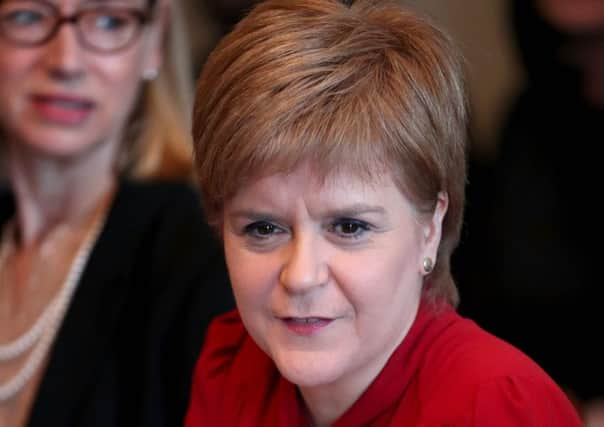Tom Peterkin: Brexit casts a long shadow over Sturgeon's indyref2


As Nicola Sturgeon hurls Scotland down the indyref helter-skelter for a second time, one thing has become clear.
Amid the blizzard of competing claims, abuse and ground hog skirmishes, we now at least know the length of time that the SNP thinks constitutes a generation – around four years, apparently.
Advertisement
Hide AdAdvertisement
Hide AdThat was one of the wisecracks doing the rounds after the First Minister launched her bid for another referendum on Monday.
But behind the (admittedly lame) witticism, it is easy to detect real anger from her opponents that Ms Sturgeon has broken the SNP’s promise that the 2014 poll would be a once in a generation event.
Ms Sturgeon, of course, takes a different view. She believes her mandate derives from her 2016 Scottish election manifesto, which said “a material change of circumstance” such as a Brexit vote would justify her pulling the trigger on indyref2.
When that manifesto was written, few would have predicted that events would have unfolded in such a way that Ms Sturgeon would feel obliged to put an independence vote back on the table with an autumn 2018/spring 2019 timetable.
Not many people thought there would be a Leave vote on 23 June last year. David Cameron certainly didn’t think so when his unexpected majority in the 2015 general election led to him calling it. Similarly, Ms Sturgeon must have also thought it was unlikely.
Nevertheless the Brexit vote happened and, despite protestations that Scotland should abide by a UK-wide vote, Ms Sturgeon has led the nation to the top of the helter-skelter.
Brexit lies at the root of where Scotland stands today and has given Ms Sturgeon the opportunity/excuse to call a second referendum. But it also continues to cast a very long shadow over the indyref2 process.
Just as the hardening of opinion against independence that has resulted from the insistence of an early re-run poses a risk to the First Minister, so does an independent Scotland’s relationship with the EU.
Advertisement
Hide AdAdvertisement
Hide AdUntil a couple of days ago, the received wisdom – propagated by the First Minister – had been that the over-riding reason for holding a referendum was that an independent Scotland would be free to be an EU member when the rest of the UK departed.
But in the complex world of Brexit politics, engineering such an outcome is far from easy. Despite the SNP launching a charm offensive among European leaders, countries like Spain – facing their own secessionist movements – are implacably opposed to an independent Scotland waltzing into the EU.
The practical difficulties of how an independent Scotland manages to secure its own EU membership have been illustrated by the failure of key SNP figures to deal with the issue when questioned on it over the last couple of days.
Both Ms Sturgeon and the external affairs secretary Fiona Hyslop have been far from convincing when asked to spell out whether an independent Scotland would seek EU membership.
Perhaps that is also because Brexit poses a problem closer to home. Polls have suggested there are around 400,000 independence-supporting Scots who do not share Ms Sturgeon’s pro-EU sensibilities. These are the Yes-voting Brexiteers, personified by the likes of the former SNP cabinet secretary Alex Neil and the former SNP deputy leader Jim Sillars.
Why would they be prepared to vote for a vision of independence that involves handing over power to Brussels?
A rise in Euroscepticism across Scotland was identified in ScotCen’s annual Scottish Social Attitudes Survey published yesterday. The survey found two-thirds of Scots would either want the UK to leave (25 per cent) or powers to be reduced (42 per cent).
“The EU is potentially a divisive issue for the Nationalist movement, while the commitment of many voters in Scotland to remain in the EU does not appear to be especially strong. As a result, a referendum that is called on the basis that independence would enable Scotland to remain part of the EU may not necessarily provide the most propitious circumstances for Nationalists to win a second referendum after all,” said the ScotCen survey.
Advertisement
Hide AdAdvertisement
Hide AdMs Sturgeon must be wondering whether it was wise to nail her saltire quite so firmly to the EU mast.
The increasing Euroscepticism perhaps also explains suggestions that she is now looking at the EU in a different light.
Instead of the SNP’s long-standing policy of EU membership, the First Minister is understood to be exploring the notion of Scotland signing up to the European Free Trade Association (EFTA) instead. The ultimate aim would still be EU membership, but joining EFTA – which would secure single market access – could be a staging post on the way.
That tactic is likely to prove attractive to the Yes-voting Brexiteers. (Even though in many cases one suspects that when they are alone in the ballot box their enthusiasm for Scottish independence is likely to over-ride their reservations about the EU).
The other side of the coin, however, is that there will be others whose sense of betrayal intensifies.
They are the voters who will be unable to avoid the conclusion that the SNP has simply used Brexit as an excuse for another shot at Scottish independence.